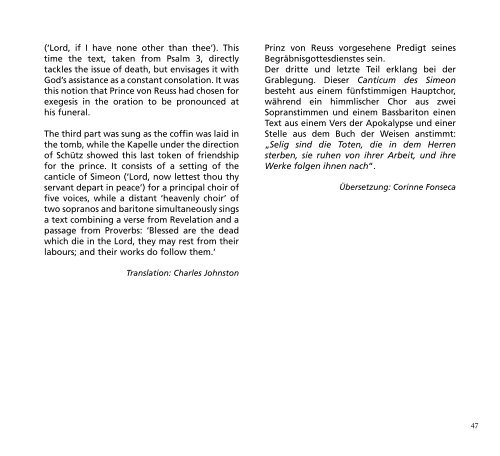Histoire de la Résurrection & Musikalische Exequien - La Chapelle ...
Histoire de la Résurrection & Musikalische Exequien - La Chapelle ...
Histoire de la Résurrection & Musikalische Exequien - La Chapelle ...
Create successful ePaper yourself
Turn your PDF publications into a flip-book with our unique Google optimized e-Paper software.
(‘Lord, if I have none other than thee’). This<br />
time the text, taken from Psalm 3, directly<br />
tackles the issue of <strong>de</strong>ath, but envisages it with<br />
God’s assistance as a constant conso<strong>la</strong>tion. It was<br />
this notion that Prince von Reuss had chosen for<br />
exegesis in the oration to be pronounced at<br />
his funeral.<br />
The third part was sung as the coffin was <strong>la</strong>id in<br />
the tomb, while the Kapelle un<strong>de</strong>r the direction<br />
of Schütz showed this <strong>la</strong>st token of friendship<br />
for the prince. It consists of a setting of the<br />
canticle of Simeon (‘Lord, now lettest thou thy<br />
servant <strong>de</strong>part in peace’) for a principal choir of<br />
five voices, while a distant ‘heavenly choir’ of<br />
two sopranos and baritone simultaneously sings<br />
a text combining a verse from Reve<strong>la</strong>tion and a<br />
passage from Proverbs: ‘Blessed are the <strong>de</strong>ad<br />
which die in the Lord, they may rest from their<br />
<strong>la</strong>bours; and their works do follow them.’<br />
Trans<strong>la</strong>tion: Charles Johnston<br />
Prinz von Reuss vorgesehene Predigt seines<br />
Begräbnisgottesdienstes sein.<br />
Der dritte und letzte Teil erk<strong>la</strong>ng bei <strong>de</strong>r<br />
Grablegung. Dieser Canticum <strong>de</strong>s Simeon<br />
besteht aus einem fünfstimmigen Hauptchor,<br />
während ein himmlischer Chor aus zwei<br />
Sopranstimmen und einem Bassbariton einen<br />
Text aus einem Vers <strong>de</strong>r Apokalypse und einer<br />
Stelle aus <strong>de</strong>m Buch <strong>de</strong>r Weisen anstimmt:<br />
„Selig sind die Toten, die in <strong>de</strong>m Herren<br />
sterben, sie ruhen von ihrer Arbeit, und ihre<br />
Werke folgen ihnen nach“.<br />
Übersetzung: Corinne Fonseca<br />
47



